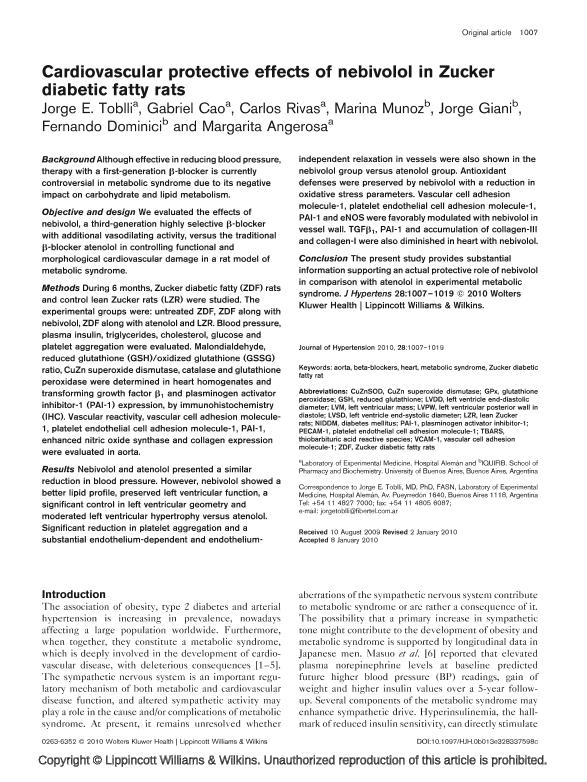Artículo
Cardiovascular protective effects of nebivolol in Zucker diabetic fatty rats
Toblli, Jorge Eduardo ; Cao, Gabriel Fernando
; Cao, Gabriel Fernando ; Rivas, Carlos Francisco; Muñoz, Marina Cecilia
; Rivas, Carlos Francisco; Muñoz, Marina Cecilia ; Giani, Jorge Fernando
; Giani, Jorge Fernando ; Dominici, Fernando Pablo
; Dominici, Fernando Pablo ; Angerosa, Margarita
; Angerosa, Margarita
 ; Cao, Gabriel Fernando
; Cao, Gabriel Fernando ; Rivas, Carlos Francisco; Muñoz, Marina Cecilia
; Rivas, Carlos Francisco; Muñoz, Marina Cecilia ; Giani, Jorge Fernando
; Giani, Jorge Fernando ; Dominici, Fernando Pablo
; Dominici, Fernando Pablo ; Angerosa, Margarita
; Angerosa, Margarita
Fecha de publicación:
05/2010
Editorial:
Lippincott Williams
Revista:
Journal of Hypertension
ISSN:
0263-6352
Idioma:
Inglés
Tipo de recurso:
Artículo publicado
Clasificación temática:
Resumen
BACKGROUND: Although effective in reducing blood pressure, therapy with a first-generation [beta]-blocker is currently controversial in metabolic syndrome due to its negative impact on carbohydrate and lipid metabolism. OBJECTIVE AND DESIGN: We evaluated the effects of nebivolol, a third-generation highly selective [beta]-blocker with additional vasodilating activity, versus the traditional [beta]-blocker atenolol in controlling functional and morphological cardiovascular damage in a rat model of metabolic syndrome. METHODS: During 6 months, Zucker diabetic fatty (ZDF) rats and control lean Zucker rats (LZR) were studied. The experimental groups were: untreated ZDF, ZDF along with nebivolol, ZDF along with atenolol and LZR. Blood pressure, plasma insulin, triglycerides, cholesterol, glucose and platelet aggregation were evaluated. Malondialdehyde, reduced glutathione (GSH)/oxidized glutathione (GSSG) ratio, CuZn superoxide dismutase, catalase and glutathione peroxidase were determined in heart homogenates and transforming growth factor [beta]1 and plasminogen activator inhibitor-1 (PAI-1) expression, by immunohistochemistry (IHC). Vascular reactivity, vascular cell adhesion molecule-1, platelet endothelial cell adhesion molecule-1, PAI-1, enhanced nitric oxide synthase and collagen expression were evaluated in aorta. RESULTS: Nebivolol and atenolol presented a similar reduction in blood pressure. However, nebivolol showed a better lipid profile, preserved left ventricular function, a significant control in left ventricular geometry and moderated left ventricular hypertrophy versus atenolol. Significant reduction in platelet aggregation and a substantial endothelium-dependent and endothelium-independent relaxation in vessels were also shown in the nebivolol group versus atenolol group. Antioxidant defenses were preserved by nebivolol with a reduction in oxidative stress parameters. Vascular cell adhesion molecule-1, platelet endothelial cell adhesion molecule-1, PAI-1 and eNOS were favorably modulated with nebivolol in vessel wall. TGF[beta]1, PAI-1 and accumulation of collagen-III and collagen-I were also diminished in heart with nebivolol. CONCLUSION: The present study provides substantial information supporting an actual protective role of nebivolol in comparison with atenolol in experimental metabolic syndrome.
Palabras clave:
Aorta
,
Beta Blockers
,
Metabolic Syndrome
,
Zucker Diabetic Fatty Rats
,
Heart
Archivos asociados
Licencia
Identificadores
Colecciones
Articulos(IQUIFIB)
Articulos de INST.DE QUIMICA Y FISICO-QUIMICA BIOLOGICAS "PROF. ALEJANDRO C. PALADINI"
Articulos de INST.DE QUIMICA Y FISICO-QUIMICA BIOLOGICAS "PROF. ALEJANDRO C. PALADINI"
Articulos(SEDE CENTRAL)
Articulos de SEDE CENTRAL
Articulos de SEDE CENTRAL
Citación
Toblli, Jorge Eduardo; Cao, Gabriel Fernando; Rivas, Carlos Francisco; Muñoz, Marina Cecilia; Giani, Jorge Fernando; et al.; Cardiovascular protective effects of nebivolol in Zucker diabetic fatty rats; Lippincott Williams; Journal of Hypertension; 28; 5; 5-2010; 1007-1019
Compartir
Altmétricas



